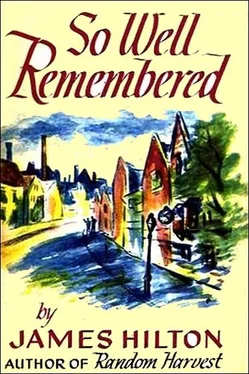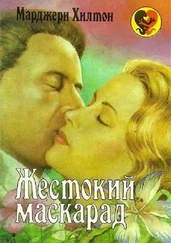Джеймс Хилтон - So Well Remembered
Здесь есть возможность читать онлайн «Джеймс Хилтон - So Well Remembered» весь текст электронной книги совершенно бесплатно (целиком полную версию без сокращений). В некоторых случаях можно слушать аудио, скачать через торрент в формате fb2 и присутствует краткое содержание. Год выпуска: 1945, Жанр: Проза, на английском языке. Описание произведения, (предисловие) а так же отзывы посетителей доступны на портале библиотеки ЛибКат.
- Название:So Well Remembered
- Автор:
- Жанр:
- Год:1945
- ISBN:нет данных
- Рейтинг книги:5 / 5. Голосов: 1
-
Избранное:Добавить в избранное
- Отзывы:
-
Ваша оценка:
- 100
- 1
- 2
- 3
- 4
- 5
So Well Remembered: краткое содержание, описание и аннотация
Предлагаем к чтению аннотацию, описание, краткое содержание или предисловие (зависит от того, что написал сам автор книги «So Well Remembered»). Если вы не нашли необходимую информацию о книге — напишите в комментариях, мы постараемся отыскать её.
So Well Remembered — читать онлайн бесплатно полную книгу (весь текст) целиком
Ниже представлен текст книги, разбитый по страницам. Система сохранения места последней прочитанной страницы, позволяет с удобством читать онлайн бесплатно книгу «So Well Remembered», без необходимости каждый раз заново искать на чём Вы остановились. Поставьте закладку, и сможете в любой момент перейти на страницу, на которой закончили чтение.
Интервал:
Закладка:
“Nay, Tom… TWO winners!” George answered, surprisingly, as he strode down the Town Hall steps into Shawgate.
On his way to Browdley station to meet them, he could not help reflecting what an extraordinary thing it really was that he should be welcoming Livia’s son to his home.
He had spent the evening with Wendover, being far too excited to settle to any solitary work; and towards midnight, for a change and because of the bright moon, he chose the slightly longer route through the waste land on the fringe of the town, where factories met fields and—less metaphorically—lovers met each other. And he thought of that evening, so many years before, yet so well remembered, when he had passed that way in the other direction, having taken old Lord Winslow to his train after the unforgettable interview. And now it was that man’s grandson and a young wife whom he was meeting—as happily as if he himself were young again and happy about most things.
In fact he was momentarily so excited that when the train drew in and they had all exchanged the first greetings, he was glad that a heavy suitcase provided something immediate and practical to attend to—there being neither cabs nor luggage delivery till next morning. Meanwhile Charles was smiling and assuring George that he didn’t in the least object to a walk on such a night, if it wasn’t too far. “Not far at all,” George answered, chiefly for something to say to the stationmaster as they passed the exit. “Except when I’m hurrying for the nine-five to Mulcaster—eh, Ted?”
They crossed the cobbled station yard and turned into the huddle of streets. A few other walkers passed or overtook them, even so late— men on their way to night-working factories, policemen, air wardens. George pointed out the stationer’s shop in Shawgate that had formerly been his Uncle Joe’s, and which still, after two changes of ownership, displayed the same mixture of leather-bound ledgers, morocco editions of the standard poets, Bibles, cookery books, and the works of Miss Florence Barclay. But as a concession to the day and age, and with that ironic innocence of which the English are so capable because they are unaware of it, a single modern edition occupied pride of place in the very centre of the window—Mein Kampf in an unexpurgated translation. George did not point this out, because he saw in it nothing remarkable; but he did draw attention to the Mayor’s office in the Town Hall with its rather florid stained-glass windows that an earlier generation had considered stylish. He kept up a running gossip, also, about Browdley people whom Charles and Julie would probably meet in due course. “The Vicar—he’ll amuse you. He’s writing a book about Roman numerals—has a theory about them—been busy on it for years —he’s eighty-eight, I think… There’s a younger chap of seventy-odd —Catholic priest—Wendover, by name—my best friend —you’ll like HIM… That’s the new municipal swimming-bath— just finished before the war began. Like a fool I said I’d make the first dive when it was opened—used to be quite a swimmer when I was a lad —but I hadn’t done any for years and I made a belly- flop that splashed all the other councillors and their wives… it was the laugh of the place the day after… Here’s the real business centre—the banks, Woolworth’s, Lipton’s. And down that street is where I managed to enter the world—the house isn’t there any more, and that’s another thing I managed.”
Julie said: “You’d make a good guide, Mr. Boswell. Too bad there aren’t any Cook’s tours to places like this.”
“Aye, it IS too bad. Some of the London folks ought to come here once in a lifetime. They’d learn more than they would on the French Riviera—and about their own country at that… And don’t you go on calling me Mr. Boswell. Nobody here does.”
Presently Charles remarked: “And you’ve never had a raid?”
“So far, not a solitary bomb. They say you shouldn’t even whisper such a thing—but I’m not superstitious. All I sometimes wish is that I could clear everybody out of the town and organize my own raid. There’s still a few thousand folks living in houses that oughtn’t to exist, and it’ll take me ten years to finish ‘em off—the houses, I mean—even when peace comes.”
George was silent again, and for a rather odd reason: at the very utterance of the phrase ‘when peace comes’ he had been swept by a sudden illusion that peace HAD come, and that Browdley under the moonlit sky was the most peaceful spot, just then, on earth.
“Now you’ll have to let ME make YOU some coffee,” he said, as they turned the corner from Shawgate into Market Street. “Because here we are— this is the old Guardian office—my printing works—this is where I live. You’ve seen most of the sights already—it’s only a small town.”
“And an honest one too,” Charles commented, as George opened the front door by merely turning the handle. “You live alone?”
“There’s Annie comes in every day to clean up a bit. She’s an old woman now, but she’ll be glad to see you because—” He was on the point of saying “because she knows who you are”, but he changed it at the last moment to “because she’s got three nephews in the R.A.F.” Which was true.
While George was ushering them inside, somebody passed along the pavement and called out the usual welcome. “‘Ow do, George. Back again?”
“How do, John. Aye, I’m back.”
It was the fourth or fifth exchange of similar greetings on their way from the station. Charles laughed and commented that George certainly seemed to be well known. George laughed also and said Aye, he wasn’t exactly a stranger in those parts. The triteness of the remarks masked the tension they both felt as they entered the little house. George led the way along the hall and into his study, where he switched on a light after verifying that the curtains were drawn. Usually, on bringing anyone there for the first time, he watched for some sign of amazement at the shelves of books, but now he actually forgot to do so and was recalled from far different thoughts when Charles exclaimed: “Quite a library.”
George then made his familiar boast that it was the best private collection in Browdley. But he added: “Not that I’d say the competition’s been very keen.” And then he heard himself launching into what now seemed just a ruefully amusing anecdote. “You know what your mother did once while I was away? Took off a lot of the paper covers and burned ‘em… Thought she was making the place tidy for me… My, I lost my temper—and that’s a thing I don’t often do… Well, how about some coffee? Come in the kitchen —it’s easier…”
They sat with the bare scrubbed table between them and had tea, after all, not coffee, because at the last moment George had felt shy of his coffee-making prowess compared with Charles’s, and asked if tea wouldn’t do as well. Charles and Julie said it would, so George made his own favourite brew, which he could not imagine anyone disliking, though for the connoisseur it would have been nauseatingly strong. He then put plenty of milk and sugar into his own large cup, stirred it round, and was reminded of innumerable times when, as a boy, he had carried a can of the same mixture to his father at Channing’s Mill on cold winter mornings and had sneaked a sip or two on the way.
George talked about the war and the post-war world; the news in the papers was very encouraging, and he found it hard as ever not to be optimistic, though after a lifetime of experience he could keep his optimism under wry control. He still had ambitions, dreams, plans, and hopes; and if a small portion of them ever came to anything, well, that was as much as a reasonable man could expect, but it was also as little as a patient man would accept. “It’s no good your people asking for the moon,” a testy political opponent had said at the last Council meeting; to which he had replied: “Nay, Tom —it’s the SUN they’re asking for—the MOON’S what I’ve promised ‘em when the war’s over. And if you fellers have any sense ye’ll settle for that as a fair compromise.”
Читать дальшеИнтервал:
Закладка:
Похожие книги на «So Well Remembered»
Представляем Вашему вниманию похожие книги на «So Well Remembered» списком для выбора. Мы отобрали схожую по названию и смыслу литературу в надежде предоставить читателям больше вариантов отыскать новые, интересные, ещё непрочитанные произведения.
Обсуждение, отзывы о книге «So Well Remembered» и просто собственные мнения читателей. Оставьте ваши комментарии, напишите, что Вы думаете о произведении, его смысле или главных героях. Укажите что конкретно понравилось, а что нет, и почему Вы так считаете.










